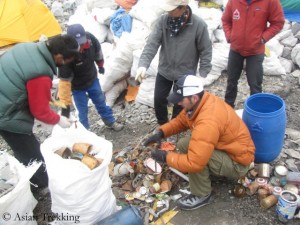With garbage bag on Everest
Such big garbage bags have guaranteed not yet been brought down from Mount Everest. The Expedition Operator’s Association Nepal (EOA) has delivered canvas bags, capable of holding 80 kilograms, to Everest Base Camp. They are to be used in particular for transporting old tents and garbage, which have accumulated in Camp 2 at 6,400 meters due to the premature end of the climbing seasons in 2014 and 2015, down to the valley. 80-kg bags are, of course, too heavy to be shouldered by porters and carried through the Khumbu Icefall to Everest Base Camp.
Two dollars per kilo
For this purpose, the helicopters are to be used that are currently transporting equipment of the expedition teams for the upcoming spring season to Camp 2. On the return flight to Base Camp they are empty and therefore can take back the full garbage bags. The New Zealander Russell Brice, head of the expedition operator Himalayan Experience, said, he was paying his Sherpas two dollars per kilo of trash they bring on their way back from Camp 3 (7,300 meters) or Camp 4 (7,950 meters) down to Camp 2. The “Eco Everest Expedition” run by the operator Asian Trekking has once again committed itself to bring down “old garbage, in addition to our own”.
Comparatively low deposit
For many years, the mountaineers have been obliged to dig or burn their organic waste. Recyclable material such as plastic or glass must be returned to Kathmandu as well as empty oxygen bottles or batteries. Any expedition team that breaches the rules risks not getting back their garbage deposit of US $ 4000. It remains to be seen whether this small sum – compared to the overall turnover on Everest – can really deter polluters.
Glacier melt reveals old garbage
Of course, there is also old garbage on the mountain, from times when environmental protection was still a foreign word. In addition, the increasing glacier melt on Everest as a result of climate change reveals tents or oxygen bottles from the 1990s or even earlier which the mountaineers had once thoughtlessly disposed in crevasses.









